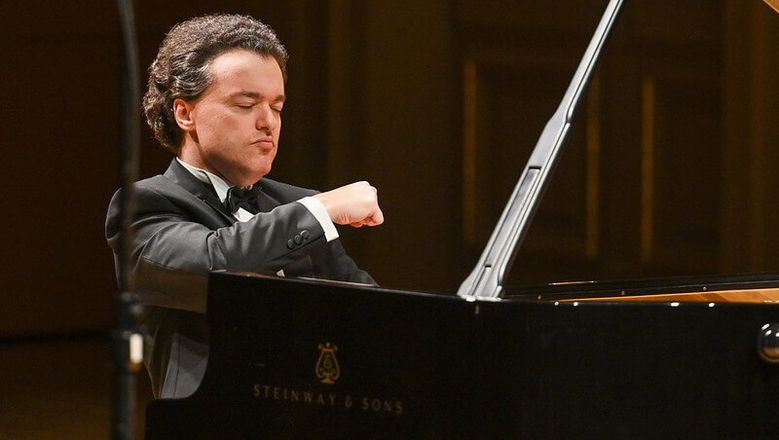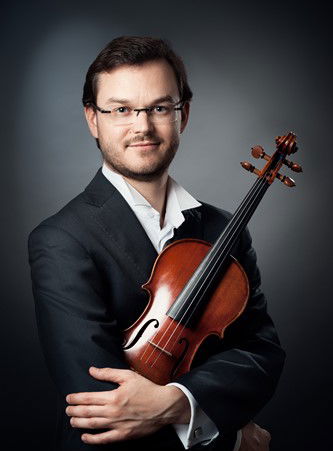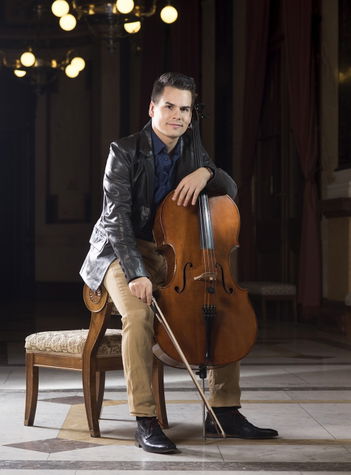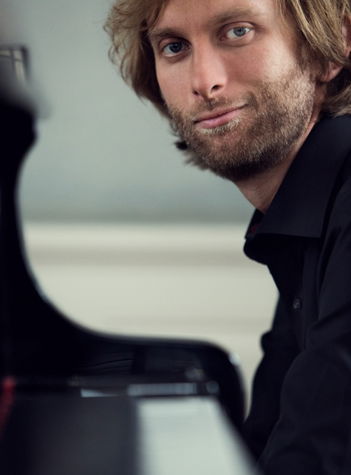Programme
Evgeny Kissin
Trio for violin cello and piano
Antonín Dvořák
Piano Quintet No. 2 in A major, Op. 81
Russian pianist Evgeny Kissin will perform at a special concert of the Czech Chamber Music Society. Together with the concert masters of the Czech Philharmonic, he will perform his own piano trio to express his critical opinion on the military invasion of Ukraine. The programme will be complemented by Antonín Dvořák's second piano quintet.
Chamber ensembles | Czech Chamber Music Society
Evgeny Kissin
Trio for violin cello and piano
Antonín Dvořák
Piano Quintet No. 2 in A major, Op. 81
Jan Fišer violin
Petra Brabcová violin
Jiří Pinkas viola
Václav Petr cello
Ivo Kahánek piano
Evgeny Kissin piano

Jan Fišer violin

Czech Philharmonic concertmaster Jan Fišer already exhibited his obvious musical talent as a child, winning many competitions (Kocian Violin Competition, Concertino Praga, UNESCO Tribune of Young Musicians, Beethoven’s Hradec etc.). He comes from a musical family, quite literally a family of violinists—his father is one of the most respected violin teachers in this country, and his younger brother Jakub plays first violin in the Bennewitz Quartet. Jan Fišer took his first steps as a violinist under the guidance of Hana Metelková, and he later studied at the Prague Conservatoire under Jaroslav Foltýn. He went through the famed summer programme of the Meadowmount School of Music three times, where he also met his future teacher, the concertmaster of the Pittsburgh Symphony Orchestra Andrés J. Cárdenes. It was in the studio of that important professor who continued the great Ysaÿe–Gingold–Cárdenes tradition of violin pedagogy that Fišer graduated from the Carnegie Mellon University School of Music in Pittsburgh in 2003.
Just when he was deciding whether to remain in the USA or to return to the Czech Republic, the Prague Philharmonia announced an audition for the position of concertmaster. Fišer won the job and stayed with the orchestra for a full sixteen years, until he left the first chair of the Prague Philharmonia for the same position with the Czech Philharmonic, where he remains to this day alongside Jan Mráček and Jiří Vodička. He has also appeared as a guest concertmaster with the BBC Symphony Orchestra, the Bamberg Symphony, and the Deutsche Radio Philharmonie Saarbrücken Kaiserslautern; he also collaborates with important Czech orchestras as a soloist (Prague Philharmonia, Janáček Philharmonic in Ostrava etc.). He has assumed the role of artistic director of the Czech Philharmonic Chamber Orchestra.
Besides engaging in a wealth of orchestral and solo activities, he also devotes himself actively to playing chamber music. With pianist Ivo Kahánek and cellist Tomáš Jamník, he belongs to the Dvořák Trio, which has already enjoyed many successes at competitions (such as the Bohuslav Martinů Competition) and on concert stages both at home and abroad. Jan Fišer has appeared at festivals abroad and in famed concert halls worldwide not only as a soloist, but also as a chamber music player. For example, the Dvořák Trio has made guest appearances at the Dresden Music Festival and at renowned concert halls like the Berlin Philharmonie and Hamburg’s Elbephilharmonie.
Fišer’s French violin from the early 19th century is attributed to the violinmaker François-Louis Pique; the instrument has also been heard in recording studios: Jan Fišer records for television and radio, and he was one of the five laureates to take part in recording the CD “A Tribute to Jaroslav Kocian” for the 40th anniversary of the Kocian International Violin Competition. He is also following in his father’s footsteps as a pedagogue, serving as one of the mentors for the MenART scholarship academy, and he regularly teaches at music courses including the Ševčík Academy in Horažďovice and the Telč Music Academy.
Petra Brabcová violin
Petra Brabcová is a graduate of Prague’s Jan Neruda Grammar School, of the Prague Conservatoire, and of Michigan State University in the USA, where she studied under Charles Avsharian. She completed her studies at Prague’s Academy of Performing Arts under Ivan Štraus. She is a laureate of several international competitions including Beethoven’s Hradec, the American String Teachers National Solo Competition, the Henri Marteau International Violin Competition, and Prague Spring 2010 (the Josef Suk Prize). She is also an experienced chamber music player. She plays in the Orbis Trio, which has won several international competitions and earned the 2010 Czech Chamber Music Society Award. She also plays in ensembles including the Prague Variations, the Baborák Ensemble, and the Prague Chamber Soloists. Besides appearing in chamber music and in orchestras, she also gives concerts as a soloist. From 2010 to 2014 she was a member of the Prague Philharmonia, and she is now the Czech Philharmonic’s principal second violinist.
Jiří Pinkas viola
Jiří Pinkas studied the violin and viola at the Prague Academy of Performing Arts. During his studies, he became a laureate of the Conservatory competition in Ostrava (1999) and participated in numerous international interpretation master classes. As a soloist he has performed with the Czech Philharmonic, Prague Radio Symphony Orchestra, Chamber Orchestra of Pardubice, Pilsen Philharmonic, Carlsbad Symphony Orchestra etc.
In 2001, he became the violist of the Bennewitz Quartet which counts among the best chamber ensembles on the international music scene. The quartet won the 1st prize at the International Chamber Music Competition in Osaka, Japan (2005) and the 1st prize at the String Quartet Competition Premio Paolo Borciani in Italy (2008). The Bennewitz Quartet is regularly invited to the prestigious world stages (Amsterdam Concertgebouw, Londonʼs Wigmore Hall, Rockefeller Center, New York, Tokyo Bunka Kaikan, Herkulessaal in Munich, Auditorio Nacional Madrid and others).
Václav Petr cello

One of the finest Czech cellists, Václav Petr has served as concert master of the Czech Philharmonic cello section for over a decade. He has performed as a soloist since the age of 12. As a member of The Trio, he has also devoted to chamber music.
Václav Petr learned the rudiments of viola playing at the Jan Neruda School in Prague from Mirko Škampa and subsequently continued to study the instrument at the Academy of Performing Arts in the class of Daniel Veis, graduating under the guidance of Michal Kaňka. He further honed his skills at the Universität der Künste in Berlin under the tutelage of Wolfgang Boettcher, and also at international masterclasses (in Kronberg, Hamburg, Vaduz, Bonn and Baden-Baden). He has garnered a number of accolades, initially as a child (Prague Junior Note, International Cello Competition in Liezen, Talents of Europe) and then in Europe’s most prestigious contests (semi-final at the Grand Prix Emanuel Feuermann, victory at the Prague Spring Competition).
At the age of 24, after winning the audition, he became one of the youngest concert masters in the Czech Philharmonic’s history. As a soloist, he has performed with the Czech Philharmonic, the Prague Radio Symphony Orchestra, the Prague Philharmonia, the Janáček Philharmonic Ostrava and the Philharmonie Baden-Baden.
Václav Petr has made a name for himself as a chamber player too. Between 2009 and 2020, he was a member of the Josef Suk Piano Quartet, with whom he received first prizes at the competitions in Val Tidone and Verona (Salieri-Zinetti), as well as at the highly prestigious Premio Trio di Trieste. In 2019, he, the violinist and concert master Jiří Vodička, and the pianist Martin Kasík formed the Czech Philharmonic Piano Trio, later renamed The Trio. During the Covid pandemic, they made a recording of Bohuslav Martinů’s Bergerettes (clad in period costumes), which would earn them victory at an international competition in Vienna.
Ivo Kahánek piano

A musician of tremendous emotional power, depth, and expressiveness, Ivo Kahánek has gained a reputation as one of the most exciting artists of his generation. He is universally recognised as one of the foremost interpreters of Romantic piano music and is a particular specialist in Czech repertoire (awarded e.g. by Dispaison d’Or). He possesses a rare gift of creating an immediate and compelling emotional connection with his audiences. Kahánek came to public attention after winning the Prague Spring International Music Competition in 2004 and performing at the 2007 Proms Festival with the BBC Symphony Orchestra under Jiří Bělohlávek. He has collaborated with the most prestigious orchestras, including the Berlin Philharmonic (Sir Simon Rattle), the Mahler Chamber Orchestra, the Vienna Symphony Orchestra, the Czech Philharmonic, and many others. He is a graduate of the Janáček Conservatoire in Ostrava, the Academy of Performing Arts in Prague, and the Guildhall School of Music and Drama in London.
Evgeny Kissin author, piano
Evgeny Kissin’s musicality, the depth and poetry of his interpretations, and his extraordinary virtuosity have won him respect and admiration, which he deserves as one of the most talented classical pianists of his generation. He is in demand internationally, and he has appeared as a soloist with the world’s top orchestras under the baton of such famed conductors as Claudio Abbado, Vladimir Ashkenazy, Daniel Barenboim, James Levine, Lorin Maazel, and Seiji Ozawa.
Evgeny Kissin was born to a Russian Jewish family in Moscow, and he began playing piano and improvising at the age of two. At six years of age, he began studying at a Moscow school of music for talented children named after its founders, the Gnessin sisters. It was there that Anna Pavlovna Kantor became his only teacher. At age ten he appeared with an orchestra for the first time, and a year later he gave a solo recital. As a 12-year-old boy, he won international fame when a recording of his appearance with the Moscow State Philharmonic was issued on LP. That recording’s tremendous success led to the release of five more live recordings of Kissin’s performances over the next two years. Evgeny Kissin first appeared abroad in 1985, and over the following years he gave many tours and concerts all around the world. December 1988 saw the worldwide broadcast of Kissin’s appearance at the Berlin Philharmonic’s New Year’s concert under the baton of Herbert von Karajan.
Evgeny Kissin’s career has earned him many musical honours around the world. In 1991, for example, he was a special guest at the Grammy Awards Ceremony. Three years later, he became the youngest person honoured as the Instrumentalist of the Year by the magazine Musical America. He has received an Honorary Doctorate of Music from the Manhattan School of Music, the Shostakovich Award (one of Russia’s highest honours for musicians), an honorary membership of London’s Royal Academy of Music, and most recently the title of Doctor of Letters honoris causa from the University of Hong Kong.
He is a citizen of the United Kingdom and of Israel as well as of Russia. He has been living in Prague since 2017. His is a vocal critic of Russia’s military invasion of Ukraine.
Evgeny Kissin
Trio for violin, cello and piano
“I recently composed a Trio for violin, cello, and piano about the current war in Ukraine; the first movement depicts the Russian invasion, the bombings, and the Ukrainian people’s sufferings; the second movement depicts the tragedy of Ukraine and its people. In it, I quoted two Ukrainian folk songs: “Ой, выйду ж я на могилу“ (“I’ll go to the grave”) and “Горе ж менi, горе” (“Woe is me, woe”). The Finale depicts the ultimate Ukrainian victory in which I believe. The first half of the third theme of the Finale is written in the Ukrainian style, the second half — in the Jewish style, and this symbolizes three things to me: the President of the Ukraine Volodimir Zelensky is a Jew. There are Israeli volunteers fighting in the Ukrainian army. I am a Jew who was born and grew up in Russia, and since my people have always been the greatest victims of the Russian xenophobia, I have always felt a strong sense of solidarity with all its other victims. Now the Ukrainians are the main victims of Russian xenophobia and imperialism, so I believe that we Jews should be their main allies.”
Antonín Dvořák
Piano Quintet No. 2 in A major, Op. 81
The Piano Quintet in A major, Op. 81, is the more mature of Dvořák’s two compositions for this combination of instruments. Written between August and October 1887, the work reveals its creator’s mastery of instrumentation and of handling themes. Two of the movements have subtitles that suggest the presence of Slavic musical motifs, but the melancholic Dumka and the leaping Furiant are by no means the quintet’s only striking features. Dvořák skilfully combines Slavic elements with passages that make a cosmopolitan, generally European impression in the most representative sense. The quintet also radiates the serenity that Dvořák always felt at his summer residence in Vysoká. The quintet was premiered at the Rudolfinum on 6 January 1888 with the young Karel Kovařovic seated at the piano. It got a very warm reception both from critics and, for example, from Pyotr Ilyich Tchaikovsky, who heard it in Prague about a month after the premiere at one of the concerts held there in his honour. The quintet was also immediately heard abroad in such cities as Amsterdam, Frankfurt, Hamburg, and London, and it helped bring Dvořák worldwide fame.